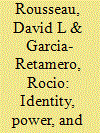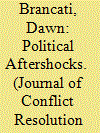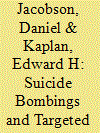| Srl | Item |
| 1 |
ID:
079526


|
|
|
|
|
| Publication |
2007.
|
| Summary/Abstract |
Realists in international relations and realistic conflict theorists in social psychology argue that the perception of threat in intergroup conflict is a function of power asymmetries between groups. In contrast, social constructivists and social identity theorists argue that a shared sense of identity can reduce perceptions of intergroup threat. In this article, we test these competing arguments using three laboratory experiments conducted in two different countries (Spain and the United States). Four findings emerge from the experiments: (1) a weak position in terms of military power increases threat perception, as realists predict; (2) shared identity decreases threat perception, as constructivists predict; (3) an interactive relationship between power and identity appears in two of the three studies; and (4) shared identity increases cooperation in economic policy areas
|
|
|
|
|
|
|
|
|
|
|
|
|
|
|
|
| 2 |
ID:
079528


|
|
|
|
|
| Publication |
2007.
|
| Summary/Abstract |
We study the effects of leadership on the private provision of a public good when group members are heterogeneously endowed. Leadership is implemented as a sequential public goods game where one group member contributes first and all the others follow. Our results show that the presence of a leader increases average contribution levels but less so than in case of homogeneous endowments. Leadership is almost ineffective, though, if participants do not know the distribution of endowments. Granting the leaders exclusion power does not lead to significantly higher contributions
|
|
|
|
|
|
|
|
|
|
|
|
|
|
|
|
| 3 |
ID:
079525


|
|
|
|
|
| Publication |
2007.
|
| Summary/Abstract |
Although many scholars, policy makers, and relief organizations suggest that natural disasters bring groups together and dampen conflicts, earthquakes can actually stimulate intrastate conflict by producing scarcities in basic resources, particularly in developing countries where the competition for scarce resources is most intense. Capitalizing on a natural experiment design, this study examines the impact of earthquakes on intrastate conflict through a statistical analysis of 185 countries over the period from 1975 to 2002. The analysis indicates that earthquakes not only increase the likelihood of conflict, but that their effects are greater for higher magnitude earthquakes striking more densely populated areas of countries with lower gross domestic products as well as preexisting conflicts. These results suggest that disaster recovery efforts must pay greater attention to the conflict-producing potential of earthquakes and undertake certain measures, including strengthening security procedures, to prevent this outcome from occurring
|
|
|
|
|
|
|
|
|
|
|
|
|
|
|
|
| 4 |
ID:
079524


|
|
|
|
|
| Publication |
2007.
|
| Summary/Abstract |
Nations differ in their tolerance for costs of fighting and in their willingness to make concessions. We use a bargaining model of war to analyze these sensitivities. Incentives created by heightened sensitivity to costs often-but not always-contradict those created by heightened sensitivity to making concessions. The results establish the effects of the two sensitivities on key conflict variables such as the frequency with which nations initiate conflicts, are targeted, engage in long or short wars, or receive favorable or unfavorable settlements. It is often asserted that democratic leaders are more sensitive to costs and conflict outcomes than autocrats. If so, then our model suggests that when the two sensitivities reinforce each other, empirical work will yield robust effects of regime type on conflict variables, but when the two sensitivities counter each other, estimated effects will be more ambiguous unless researchers consider which sensitivity dominates.
|
|
|
|
|
|
|
|
|
|
|
|
|
|
|
|
| 5 |
ID:
079527


|
|
|
|
|
| Publication |
2007.
|
| Summary/Abstract |
This article develops sequential game models for key operational terrorist (how often to attack) and government (how often to execute targeted killings) decisions taken during a (counter-) terror campaign such as the second intifada. Key results include the following: The government initiates targeted killings when the marginal number of Israeli civilian lives saved from prevented terror attacks exceeds the marginal number of Palestinian civilian lives lost in such ``hits''; targeted killings are not employed if they are either ineffective or extremely effective at thwarting terror (since terrorists will not induce their use); even after accounting for downstream terror attacks motivated by prior targeted killings, a civilian casualty-minimizing government can optimally order targeted killings over time; and low-level cycles of violence can occur when the government is more patient than the terrorists, but higher, stable levels of violence result when the terrorists are the more patient players in the game
|
|
|
|
|
|
|
|
|
|
|
|
|
|
|
|